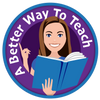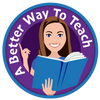The countdown is on! Spring break is behind us, and the end of the school year is so close. This time of the year might find you experiencing equal parts jubilance and stress. The stress of “getting everything covered” intermingles with the joy that soon you’ll be able to sleep in past 5 am and read whatever books you want.
If you’re feeling the crunch, I’ve got you. Here are 5 ideas for end-of-the-year lessons that are little to no prep, are actually valuable, and will give you a little extra mental space to catch up on grading, so that you’re not up until midnight the day before grades are due.
1.) Have Students Make Their Own “Would You Rather” Games
This is so simple, and yet so fun. And really simple is the name of the game at this point in the school year.
Here’s what you do:
Put students in pairs. As a team they will write five “would you rather scenarios.” Together, they’ll likely be more creative than individually. For each of their scenarios they need to add certain parts of speech:
- One scenario needs to have 2 adjectives in it
- One scenario needs to have 2 adverbs in it
- One scenario needs to have a proper noun
- One scenario needs to have an appositive phrase
- One scenario needs to have at least two vivid verbs
After groups have come up with their scenarios, you literally just go around the room and have them share their scenarios and ask volunteers to answer the scenarios.
Here’s the point: students will practice reviewing grammatical concepts and how to use these in writing.
Also, they get to be creative! Y’all, developing creativity in the context of humor is meaningful! It might not be measured on a state-mandated test, but any opportunity you can give students to think creatively will pay back huge dividends in immeasurable ways. This activity also allows for laughter and learning about each other.
Bonus: you can probably knock out a little grading while they’re thinking of their scenarios because they won’t need much help from you.

2.) Spinner Picker Games For Review
I have recently discovered the spinner picker, and I am a big fan. You can use this for so many review activities, and it is super simple to use. You can fill in text or images or even combine them both for so much spinning!

Check out the text spinner picker HERE and the image spinner picker HERE.
Here's what you do. A simple way to review grammar concepts is to create a spinner picker with the grammatical concepts you want to review. This could be parts of speech, phrases, clauses, or anything else you’d like to review.
Spin the spinner picker. Let’s say it lands on “appositive phrase.”
Then, spin the image picker. Let's say it lands on a picture of a puppy sitting on top of a donkey.
Students (in small groups or partners) write a sentence with an appositive phrase in it about the picture of the dog/donkey.
Any team that does it correctly gets a point. The BEST sentence gets 3 points (as determined by you).
It’s so simple, so easy, and TRULY works for students to review the concepts.
I have a complete detailed lesson on this including pre-made pickers and a handout for students review the concepts and write their sentences HERE (for parts of speech) and HERE (for phrases).
3.) Mr. Rogers Lesson On Human Decency

In recent years, Mr. Rogers has gotten into the hearts of thousands of Americans in a fresh way. There have been movies, podcasts, and more movies. He was a one-of-a-kind man, and is so worth learning from.
I love taking a few days at the end of the school year to read THIS ARTICLE from Tom Junod. Frankly, it may be the most beautiful article I’ve ever read. I have abridged the article with some classes in the past and sometimes we read the article in its entirety. It is long, but you can easily read only parts of it and still have some great talking points.
So here’s what we do:
- I read the article aloud (or parts of it).
- I have students highlight 8-10 sentences that stand out to them whether because of content or craft.
- We talk about why those sentences stood out.
- We talk about Mr. Rogers (I have a list of discussion questions you can use HERE).
- I have students write about an adult that impacted them.
Why do this? You get to review writing craft, but even better, this essay actually develops empathy in its readers. Try it, you’ll see.
Want the whole lesson I do for Mr. Rogers including the handout? Check it out HERE. It's a great way to end the school year on a positive note.
I taught this lesson on a job interview once and a student walked out of the classroom and told me it was one of the best lessons she’d ever had in high school. This kid didn’t even know me (I was interviewing for a position at the school), but the article is THAT GOOD.
4.) Reflect and Rewrite
Again, super simple is the name of the game.
Have students access one of their essays from the school year. Ideally, one they didn’t make an A on. Have them pick 5 sentences and spend time re-writing and intentionally crafting those sentences.
Have them look for sentences that were wordy or redundant. How could they be simpler or more clear?
Or, teach them/review with them a specific writing concept like opening adjectives or appositive phrases and then have them rewrite several sentences from their essay using that particular skill.
Have them also write a short explanation about why the sentence was weak and how they made it stronger.
Give them the class period to do this. At the end of class, they turn this into you. Don’t grade it because it’s the end of the school year. Ain’t nobody got time to grade anything extra right now. They did the exercise or they didn’t. But the ones that did it will become better writers, and you can sleep well at night knowing you gave them an opportunity for growth.
5.) Quick...ish Writes
I LOVE these short opportunities to write. What these are: they’re basically quick writes, meaning that students don’t need to agonize over them. Students write what comes to mind in response to a prompt. It doesn’t need to be perfectly organized, BUT they do need to intentionally craft one sentence in the response. That's where the "ish" part comes in. It's quick...ish.
The quick write prompt might ask them to write about their favorite musician, but they have to write one sentence in the response that has an appositive phrase.
Or the prompt might ask them to write about the hardest job they’ve ever had, but they have to include an opening adjective in one of their sentences.
These are great because the prompts are designed for students to be able to quickly think of something to write about; they typically won’t have to sit staring at the wall for a long time coming up with a response.
Since students won’t have to spend too much time agonizing over their topic, they can think a bit about their craft in a low-stakes way.
I’ve got a truckload of writing prompts in this vein that you can check out HERE and HERE.
Assign one a day for practice, or give them 4-5 to do to fill a whole class period. Take some time for them to share at the end of class. Collect them or don’t. Grade them or not. If they did the work, they will become better writers.

It’s almost the end, teacher friend. Remember, simple is the name of the game right now. Also #don’tgradeeverything.
I hope you can use one or more of these ideas, and if you do, please let me know how it goes. I would LOVE to hear about it. Send me an email or leave a note in the comments.
Related Reading:
End of The Year Activities for ELA





Leave a comment